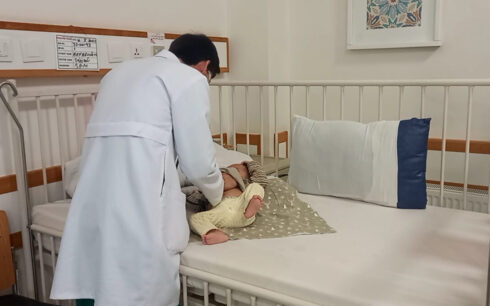KABUL, Afghanistan — The World Health Organization has reported a sharp rise in disease outbreaks and deepening health system challenges across Afghanistan, highlighting urgent humanitarian needs as tens of thousands of people face limited access to essential services amid funding shortfalls and mass displacement.
In its latest monthly emergency report posted on Thursday, April 24, WHO said it had provided emergency health services to nearly 172,000 people in March across 20 provinces, while supporting vaccination efforts, maternal care, mental health services, and responses to multiple disease outbreaks — from measles to acute watery diarrhea.
Despite these efforts, the report underscored worsening health indicators. More than 139,000 cases of acute respiratory infections (ARI-pneumonia) were recorded in March — a nearly 19 percent drop from February, yet still alarmingly high. Measles cases rose by 42.8 percent, with over 12,500 suspected cases and 82 deaths reported. WHO cited low vaccination coverage and overcrowding as key risk factors.
Outbreaks of acute watery diarrhea, malaria, dengue fever, and Crimean-Congo hemorrhagic fever (CCHF) were also tracked. Diarrheal cases rose by 9.4 percent to over 7,100 in March, while malaria infections reached 794 — a 10.9 percent increase. Though dengue fever saw a decline, health officials warned that stagnant water and climate-related factors continue to pose risks.
The COVID-19 situation remained relatively stable, with 147 confirmed cases in March — a 42 percent decrease — though WHO noted that testing had also declined.
The WHO also monitored over 114,000 people entering Afghanistan from Iran and Pakistan, including returnees and regular travelers. Among them, COVID-19 and pneumonia were the most common diagnoses, with men over five years of age disproportionately affected.
Amid these challenges, the agency emphasized the collapse of healthcare access following the U.S. government’s funding freeze in February, which led to the suspension of services at over 200 health facilities, affecting 1.8 million people. WHO called for urgent donor support to reactivate essential services.
Other highlights from the report include:
Over 32,000 children under five and 12,000 pregnant/lactating women received nutrition support.
8376 people accessed mental health services.
WHO distributed medicines, diagnostic kits, and medical supplies — including for measles, pneumonia, and scabies.
PRSEAH training reached 358 health workers to improve protection from sexual exploitation and abuse.
Afghanistan’s first female-specific opioid substitution therapy clinic was launched in Kabul.
The WHO’s monitoring mission also flagged serious infrastructure gaps: many health centers lacked clean water, waste disposal systems, or gender-separated sanitation facilities. Nearly 48 handwashing stations were found in need of rehabilitation.
As part of its response, WHO and its partners provided services to nearly 775,000 returnees in March, including 336,000 primary care consultations, 68,000 mental health sessions, and 46,000 maternal and reproductive health services.
Despite immense challenges, WHO said its teams continue to scale up interventions — but warned that sustained funding and international coordination are vital to preventing further deterioration of Afghanistan’s public health system.





